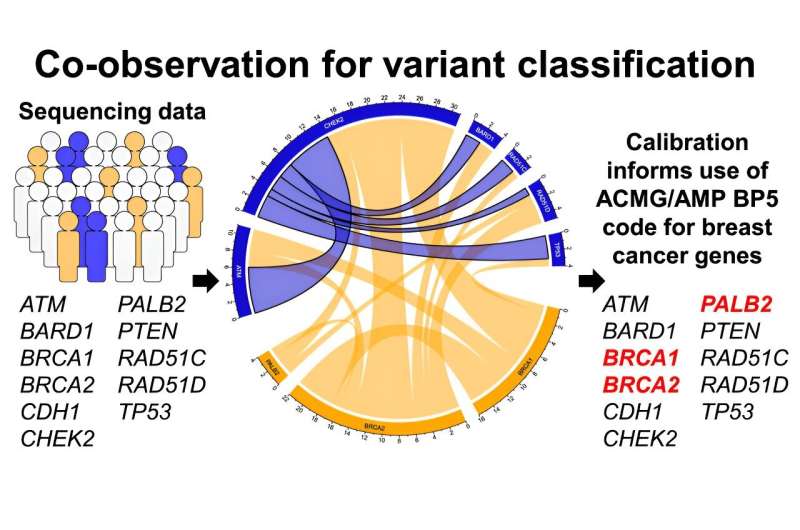This article has been reviewed according to Science X's editorial process and policies. Editors have highlighted the following attributes while ensuring the content's credibility:
fact-checked
peer-reviewed publication
proofread
New international guidelines could boost accuracy for cancer genetic testing

New international guidelines developed by QIMR Berghofer researchers are expected to improve the accuracy of genetic tests that determine a person's cancer risk.
As genetic testing becomes more prevalent, many people want to understand their likelihood of developing cancer. These new guidelines are expected to reduce the number of uncertain test results by up to 85%, helping to avoid unnecessary medical treatment and anxiety.
The guidelines apply to testing for BRCA1 and BRCA2 gene variants, which play a crucial role in determining a person's risk of hereditary breast and ovarian cancer and other related cancers.
The guidelines align with the Food and Drug Administration (FDA) requirements and have been published in The American Journal of Human Genetics.
Professor Amanda Spurdle from QIMR Berghofer said about 15% of people tested receive uncertain results.
"Genetic tests aren't always clear and sometimes they show changes in genes that aren't fully understood. This can make it difficult for doctors and patients to decide on the best treatment plan," Professor Spurdle said.
"The new guidelines combine global clinical and research experience with advanced statistical methods, providing clearer recommendations about what variants are important and that then informs the management."
Co-lead author Michael Parsons from QIMR Berghofer said the interpretation of gene variants could vary between diagnostic laboratories, meaning people with the same results might receive different treatments and very different outcomes.
"This publicly available protocol will standardize the way BRCA1 and BRCA2 variants are classified, helping to reduce concern for clinicians and patients, and avoid treatment that isn't needed," he said.
The QIMR Berghofer researchers led an international research team of 43 scientists and clinicians to develop the guidelines. They have been approved by ClinGen, an organization that helps define the clinical relevance of gene variants for use in medicine and research.
ClinGen Hereditary Cancer Co-chair Sharon Plon is excited to see the availability of worldwide uniform guidelines. "These are some of the most frequently tested genes important for preventing cancer. Having a ClinGen set of specifications for laboratories around the world to use will improve the quality of genetic testing and reduce differences among these labs and make results more consistent."
The research team will continue to contribute to a central global resource of information about genes and variants to improve patient care, managed by ClinGen (Clinical Genome Resource).
The guidelines will also help clinicians decide whether to test close relatives to aid prevention and early detection.
More information: Aimee L. Davidson et al, Co-observation of germline pathogenic variants in breast cancer predisposition genes: Results from analysis of the BRIDGES sequencing dataset, The American Journal of Human Genetics (2024). DOI: 10.1016/j.ajhg.2024.07.004





















